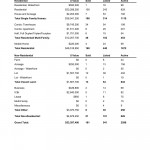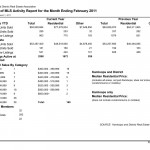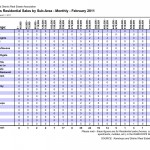This article appeared on Reuters on March 1st, 2011 and was written by Randall Palmer and Louise Egan.
OTTAWA (Reuters) – The Bank of Canada left its key interest rate unchanged at 1 percent on Tuesday and gave no signal it plans to raise rates soon, spurring traders to scale back rate-hike bets and to knock the Canadian dollar off a three-year high.
The central bank repeated the exact language on rates that it used in its January rate announcement, saying that while considerable monetary stimulus remains in place “any further reduction in monetary policy stimulus would need to be carefully considered”.
It said the Canadian recovery was moving a bit faster than it expected and hailed a budding recovery in net exports. But it cautioned that the export sector “continues to face considerable challenges from the cumulative effects of the persistent strength in the Canadian dollar and Canada’s poor relative productivity performance”.
Investors hoping for a hint that recent strong economic data would prompt the bank to resume rate hikes at its next decision date on April 12 were disappointed. The Canadian dollar weakened against the U.S. currency following the stay-the-course statement. “On balance, it suggests no imminent rate move,” said Paul Ferley, assistant chief economist at Royal Bank of Canada.
It also raised more doubts about whether the bank would move on rates at either its April 12 or May 31 policy-announcement dates.
Most analysts polled by Reuters last week predicted the bank would resume rate hikes in the first half of the year, with May 31 being the most likely date for the next move. Markets “perhaps got ahead of themselves in their expectations for first-half rate hikes,” said Jacqui Douglas of TD Securities.
Canada was the first of the major industrialized countries to start lifting rates from emergency lows last year, raising borrowing costs three times between June and September. The bank then moved to the sidelines, saying it needed more evidence the U.S. and global recoveries were gaining traction.
After fourth-quarter economic growth came in stronger than expected at 3.3 percent and the U.S. economy showed signs of strength, many economists expected the Bank of Canada to signal plans to resume tightening monetary policy in coming months.
“Nothing much new here,” said Avery Shenfeld, economist at CIBC World Markets, of the bank’s statement. “Therefore, perhaps not really as hawkish as some might have been expecting.”
Overnight index swaps, which trade based on expectations for the key central bank rate, showed traders pricing in less of a chance of rate hikes at upcoming Bank of Canada announcements. Investors see a 92.20 percent probability rates will stay on hold April 12, up from 86.49 percent before the statement, according to a Thomson Reuters calculation.
The Canadian dollar retreated to as low as C$0.9756 to the U.S. dollar, or $1.0250, after the bank’s announcement from C$0.9714, or $1.0294, just before. Money market rates and bond yields fell slightly.
The central bank said the global economic recovery was proceeding broadly in line with its January projection and the recovery in Canada was slightly faster than expected.
It remained sanguine about prices even though it added a reference to the Libya crisis by flagging “geopolitical events” that could push commodity prices higher.
Canada has so far been relatively immune to price pressures with annual inflation of 2.4 percent in January and a core rate of 1.4 percent. “Underlying pressures affecting prices remain subdued, reflecting the considerable slack in the economy,” the bank said.
There is more evidence that the engines of growth in Canada are shifting to exports and business investment from consumer spending and fiscal stimulus, it said.
Household debt is less of a concern than it had been in past months. Consumer spending remains strong but is easing to levels more in line with incomes, the bank said.
In addition to the tentative export recovery, business investment is picking up speed, it added, helped by low borrowing costs and the need to compete.
Link




